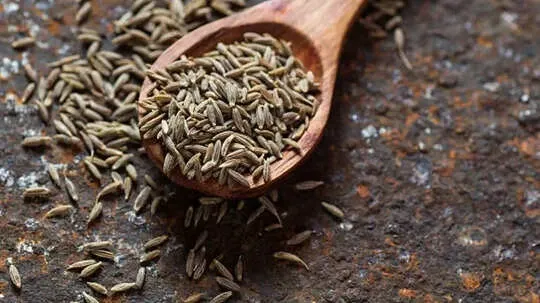What happens to Your Body When You Add Cumin to Your Daily Diet for 30 days?
admin | August 27, 2025 2:22 PM CST

Cumin is a popular spice used in cooking across the world. Made from the seeds of the Cuminum cyminum plant, cumin belongs to the parsley family and is grown mostly in China, India, and Mexico.
According to experts, it has immense health benefits and gives a boost to your wellness if added to your daily diet.
Cumin has a few unique properties that make this nutty spice worth a try for most people. So, what happens when you incorporate it into your food for 30 days?
Health benefits of adding cumin to your diet
Helps in weight loss
According to studies, consuming about a half teaspoon of roasted cumin, which is 1.5 grams, with yogurt before breakfast and lunch for at least a month can help in reducing weight, body mass index (BMI), and waist circumference.
Cumin has a unique active ingredient known as thymoquinone - a naturally occurring chemical that has antioxidant and anti-inflammatory properties. While thymoquinone targets free radicals in your body, it also cleanses it of toxins.
Lowers cholesterol
Having around three grams of cumin daily in your food can help reduce serum levels of fasting cholesterol, triglycerides, and low-density lipoprotein or bad cholesterol. It also increases good cholesterol and maintains a balance.
Promotes digestion
The most common traditional use of cumin is for indigestion. Adding it to your daily food can rev up normal digestion by increasing the activity of digestive enzymes.
According to experts, cumin increases the release of bile from the liver, which in the long run helps digest fats and certain nutrients in your gut.
Aids in the prevention of diabetes
Doctors advise adding cumin to your daily meals if you have high blood sugar levels. Research suggests cumin has components like cuminaldehyde that impact blood sugar by inhibiting enzymes in the carbohydrate metabolism pathway.
Packed with iron
Since cumin has iron, its consistent use can help those suffering from anemia. A study says a teaspoon of ground cumin, which contains 1.4 mg of iron, or 17.5 per cent of the RDI for adults, is good enough to battle low iron levels in your body, which can cause tiredness and fatigue.
Iron deficiency is one of the most common nutrient deficiencies, affecting up to 20 per cent of the world's population and up to 10 in 1,000 people in the wealthiest nations.
Has anti-cancer properties
Animal studies have revealed that cumin powder has an effect of around 96 per cent in reducing anti-cancer genes and controlling tumours. The spice also inhibits inflammation, especially with a key inflammation marker, NF-kappaB.
Who should avoid taking cumin?
According to doctors, you should avoid taking cumin if you:
- Have an allergy to parsley, as it is from the same family as cumin
- If you suffer from low blood sugar or are at risk for hypoglycemia
- If you are pregnant or breastfeeding
- If you have a bleeding disorder or are going to have surgery
READ NEXT
-
Tamil Nadu CM M K Stalin joins ‘Voter Adhikar Yatra’ in Bihar

-
Taylor Swift’s engagement diamond ring worth crores revealed

-
Bigg Boss 19: Tanya Mittal Brings 800 Sarees Inside House, Faces Eviction After Nomination

-
Oil Prices Hold Steady Amid Russia-Ukraine Conflict And Fresh US Tariffs On India

-
Despite Tariff Shock, Indian Corporate Debt Market To Remain Strong, Says Report
